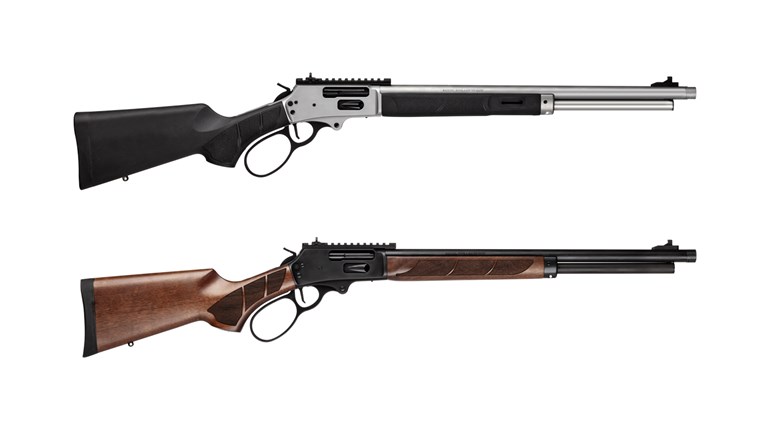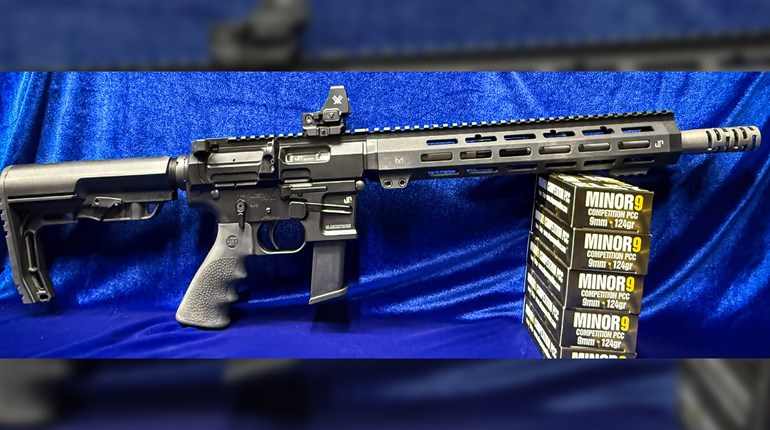
Short, handy and quick have described many lever-action carbines since the 1870s. Slab-sided and compact, the lever-action repeater has been the everyman’s handy rifle, the workhorse tool for settling everything from bad hombres to charging grizzlies. But in .223 Remington?

The .223 Remington/5.56 NATO chambering isn’t the only unusual thing about Henry’s new Long Ranger Express rifle. Henry spins the old lever-action in a new direction with a detachable, vertical-stack magazine, a laminated stock, a black anodized aluminum receiver and a 16.5-inch blued barrel that has no sights.
This is not John Wayne’s lever-action carbine. But it could be yours. If you’re looking for a compact, quick and scope-sighted (or red dot) coyote/varmint/deer rifle or personal defense rifle, the Long Ranger Express might fit your needs.
While unusual, Henry’s latest take on the lever action is not the first time anyone chambered these iconic American rifles for a .22-caliber cartridge. Winchester’s delightful little .218 Bee was introduced in the M65 lever-action (basically the old Model 1892) in 1937, but those cartridges were throttled by the flat-nose bullets used in that rifle’s tubular magazine.
Savage showed the route around this with its vertical stack magazine M99 rifle. It was chambered for the .22 Savage Hi-Power, later the .22-250 Remington, but never the .223 Remington. Winchester’s M88 of 1964 was also engineered to handle spire-point bullets, but never chambered .223 Remington. Browning’s BLR, which looks suspiciously like the Henry Long Ranger, was and is chambered for the .223 Remington, but never in a 16.5-inch barrel without iron sights.
Yes, the Long Ranger is unique despite its resemblance to the BLR. Both the Henry and Browning use drop-out magazines plus rack-and-pinion gearing to drive their bolts. Both feature an external hammer, anodized aluminum receiver, side port ejection and two-piece stocks. But the trigger of the BLR travels with the lever. The trigger of the Long Ranger remains in the receiver during lever travel. For safety, the Long Ranger’s trigger also lifts a transfer bar that catches the hammer blow and transfers it to the firing pin. This simple system ensures that a slip of the hammer or a blow to the back of it might drive it forward, but unless the trigger is pulled to push the transfer bar into place, the firing pin will not be touched and the cartridge will not fire.

The Long Ranger’s hefty steel bolt sports six locking lugs at its front. A gap between two on the left rides a steel guide rail inside the left wall of the aluminum receiver, contributing to smooth, straight-line bolt travel with no binding. A camming action when the bolt is closed turns the locking lugs into recesses in the steel barrel extension for an accuracy-enhancing lockup. This is why/how the receiver can be made of lighter weight aluminum that plays no role in the job of containing high-pressure bullet launch.
The side ejection port, 3¹⁄₁₆ inches long, is nearly an inch longer than needed for a .223 Remington cartridge, reflecting this action’s “shared duty” as the platform for larger cartridges such as .308 Winchester.
The bolt face, like most push feeds, encloses the head of each cartridge. An extractor hook inset in the head snaps over case rims when locked into battery. A spring-loaded plunger ejector in the bolt face pushes cases off. The bottom of the bolt face catches the upper rim of each cartridge at the top of the magazine to push it forward. When the cartridge clears the magazine lips, it springs out and continues being pushed into battery. The rifle can then be fired or the hammer eased down for extra safe carry.
As is typical of many lever-actions, my test model Long Ranger Express’ trigger pull was a hefty 5.25 to 6 pounds. I felt just the tiniest bit of mushy creep before the break, but no appreciable overtravel. At 7 pounds (8 pounds 5 ounces with rings and 3-9x36mm Swarovski scope mounted) the rifle is solid and nicely steady on target against the trigger pull. The factory-mounted Picatinny rail made scope/ring fitting easy, but comb height of the laminated buttstock was too low to provide sight acquisition with a firm cheek weld, despite use of the lowest scope rings in my collection. An aftermarket comb riser fixed that. Were I advising Henry, I’d advocate for a stock design with less drop at the comb and heel. A Monte Carlo stock would look out of place, but work well.

There is no checkering for enhancing grip on this stock, yet I found it surprisingly easy to grip without slip. That might change with moisture. The fore-end is narrow and quite rectangular in profile, but still feels good in hand. Mine at least. In fact, the rifle, against predictions for its length, hangs on target nicely and seems delightfully easy to control offhand. I wasn’t anticipating that.
This rifle’s black, solid rubber recoil pad has some flex to it, not that recoil absorption is needed in a .223 Remington. Length of pull at 14 inches feels right. Overall length of 37 inches makes this a handy tool when weaving through heavy cover and getting in and out of vehicles. It does compromise muzzle velocity slightly. The ½x28 threaded muzzle should accept most suppressors, another plus for the short barrel. With 4 to 6 inches of suppressor aboard, overall length remains reasonable.
A hammer extension shipped with the rifle, but the eyepiece of the Swarovski sits half an inch above the hammer spur, sufficient room for easy thumb access. The five-round steel magazine fits flush with the belly of the action and releases via a button inset in the right side of the action wall.
Because the manufacturer roll stamps .223 Rem. and 5.56 NATO on the barrel, I assume the throat has been cut long to accommodate the longer bullets often loaded in 5.56 NATO factory ammo. The 1:9-inch twist suggests the same.

Technical Specifications
• Type: lever-action centerfire rifle
• Caliber: .223 Rem./5.56 NATO
• Magazine: detachable box; 5-rnd. capacity
• Barrel: 16.5"; round blued steel; button rifled; 1:9" RH twist; ½x28 threaded muzzle
• Trigger: single-stage; 5.25 lbs.-6 lbs. pull weight
• Sights: none; Picatinny rail for optics mounting
• Safety: transfer bar
• Stock: straight comb; birch laminate; 14" LOP
• Metal Finish: hard anodized black
• Overall Length: 37"
• Weight: 7 lbs.
• Accessories: hammer extension
• MSRP: $1,235; henryusa.com




































